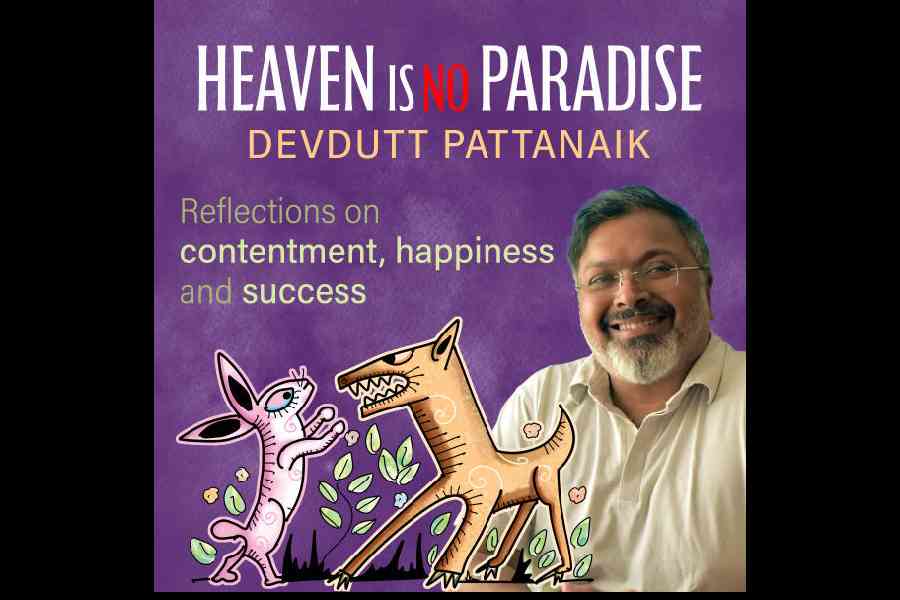In a world that constantly urges us to chase more, the idea of contentment often feels out of reach. But what if our discontent isn’t just circumstantial, but intricately wired into the way we think, the stories we tell, and the systems we live in?
In his new thought-provoking Audible Original Contentment: Heaven Is No Paradise, mythologist and author Devdutt Pattanaik invites listeners to re-examine the very nature of fulfilment. Drawing from mythology, culture, science, and storytelling, Pattanaik explores how ancient wisdom and modern realities collide in our relentless pursuit of happiness.
t2 caught up for a quick chat.
Contentment is such a profound yet slippery idea. What drew you to explore it in this audiobook, and why do you think it feels so elusive in the modern world?
I noticed that the rich, powerful, and famous people I met — despite having so much wealth, power, and agency — were profoundly unhappy. All the wealth and fame in the world had not made them happy. They were not content. And that is what inspired the book.
You suggest that the human mind is wired for discontent. How do mythology, culture, and science each explain this restlessness in us?
We are constantly told that we are successful only if we achieve something in life. We are constantly told to use language like ‘winners’ and ‘losers’. We are told to compete all the time and compare all the time. And thus, our brain is wired for discontent. We even think Ram of the Ramayan is ambitious and Krishna of the Mahabharat is competitive — which is not the case — but that is how storytellers lie to us and play with our minds.
The title, Heaven Is No Paradise, is striking. What truth about human nature or happiness does it hint at?
The title separates the idea of Heaven and Paradise. These words are used as synonyms in Western mythology — Christian and Islamic mythology. However, in South Asian mythology, Paradise is more materialistic, while Heaven is more psychological. This distinction reveals very different ideas of fulfilment.
You write about how our world is shaped by “tools, technology and tales.” Could you explain how these three elements together define what it means to be human?
When we talk about human beings, we talk about humans who create various kinds of tools. Today, we use computers and cell phones. We also create social technologies like schools, colleges, marriage — all things that do not exist in nature. Along with this, our brain is filled with tales — stories downloaded into our minds which didn’t exist at birth. Human beings are defined by objects around us, institutions we build, and the stories that shape our minds.
You contrast the tales of the East and the West — one seeking balance between nature and culture, the other enforcing truth between institutions and individuals. What do these differing worldviews reveal about how each civilisation understands happiness?
We contrast tales of East and West because they reveal different worldviews. The Old Testament of the Bible does not even refer to nature. Nature is not important there. It assumes human beings are on top of the food chain and focuses on controlling human behaviour through God’s messages. This idea is completely missing in China and India, where nature plays a very important role, and there is no transcendental God giving instructions on how humans should behave. This becomes important in colonial and post-colonial studies.
In the audiobook, you describe three human bodies — social, physical, and mental. How does understanding these layers help us come closer to real contentment?
The social body is the people around us. The physical body is our flesh and senses. The inner world is the mental body. Contentment exists in the mental body, but only when we learn how to engage with the outside world through our physical and social bodies. All three play a clear role in achieving contentment.
Do you believe true contentment is possible in a world driven by consumerism, competition, and constant comparison?
The world today is driven by consumerism, competition, and constant comparison. These are stories we have been told. But it is possible to rewire the brain and refuse to be trapped by these stories. Parents often bring consumerism, competition, and comparison into their children’s lives. They are ruining their children’s lives by downloading what we can call “malware” — instead of teaching them how to deal with a world that destroys happiness. In a way, this is a failure of parenting.
How did working in the audio format influence the way you told these stories, especially given your long experience with the written and visual forms?
The audio format is very different from the written and visual forms. In a book, you can turn pages backwards. In audio, you have to keep moving forward. Unlike visual formats, audio relies on the imagination of the listener. It is a very different and also the most ancient form of communication.
After reflecting so deeply on the nature of fulfilment, what does contentment personally mean to you today?
After reflecting deeply on the nature of fulfilment, contentment for me means observing how competitive people are and enjoying them. Narad Muni was the first sage in the world to draw attention to how competitive people are — and therefore never content. That has been my biggest learning.











